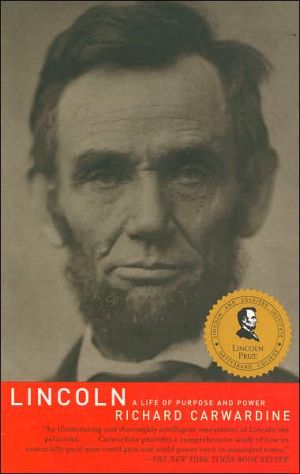

 |

|

The average rating for Lincoln: A Life of Purpose and Power based on 2 reviews is 4.5 stars.
Review # 1 was written on 2020-03-18 00:00:00 Robert Bayham Robert BayhamA British Historian Studies Abraham Lincoln Abraham Lincoln's life and career continue to fascinate and inspire Americans. Richard Carwardine's recent study: "Lincoln: A Life of Purpose and Power" joins a select number of outstanding works on Lincoln written by a non-American scholar. Richard Carwardine is the Rhodes Professor of American History at Oxford University. His book, fittingly, was awarded the Lincoln prize, the first work of a British writer to be so honored. Professor Carwardine's study tells little of Lincoln's private life: his marriage, prior relationships with women, his personal interests, his depression, his sexual orientation, and other issues that have been explored in some recent works. He seems to presuppose a knowledge in his readers of the rudimentary facts of Lincoln's life. (A duel in which Lincoln participated as a young man is mentioned twice in passing but never developed.) Instead, Professor Carwardine explores Lincoln's public career, before and during his presidency, and tries to develop the traits of character and the circumstances that made Lincoln what he was. Thus, Professor Carwardine devotes a great deal of attention to Lincoln's overwhelming ambition -- noted by virtually every writer on this subject -- and his desire to make something of his life through work and effort. Professor Carwardine also emphasizes Lincoln's shrewdness, knowledge of human nature, ability to present himself, and facility at working with and blending together disparate groups and ideas. These pragmatic, practical abilities would prove essential to the tasks Lincoln was called upon to perform as president. Professor Carwardine emphasizes as well another, more thoughtful side of Lincoln. His book describes Lincoln's role as a leader who endeavored to shape and mold public opinion rather than to be led by it. Professor Carwardine describes the fundamental role that moral conviction played in Lincoln's political career -- in his lifelong belief in the evil of slavery and in his devotion to the cause of democracy and the union. The book describes well the development of Lincoln's religious convictions as he assumed the burdens of his presidency. From his origins as a skeptic and freethinker, Lincoln developed a sense of a just and providential God directing the course of human events for reasons of His own. Lincoln's theology dovetailed at some point with America's evangelical Protestantism, even though Lincoln never became a traditional believer or practicing Christian. Lincoln's religious sense and moral fervor, for Professor Carwardine, became essential to the leadership he provided during the Civil War, as evidenced by the Emancipation Proclamation and the Second Inaugural Address, among much else. Professor Carwardine offers an insightful portrayal of American life during Civil War times, particularly in middle-America as he discusses Lincoln's rise to power in Illinois and the 1858 debates with Stephen Douglas. He shows how Lincoln evolved during his years as president and how both his moral vision and his sense for the politically practicable were essential to holding the Union together and creating a sense of American nationalism. As does much modern history and biography, Professor Carwardine is at pains to separate Lincoln, the hero and the cultural icon, from Lincoln the man, and from the facts of his life. But in spite of these efforts and of Professor Carwardine's own understated conclusions, this book presents the reader with a remarkable man and a remarkable life. Professor Carwardine concludes: "While he was certainly not reluctant to wield political authority, his practical policy grew from a strong sense of moral purpose, and his course as president was shaped not by impulsive, self-aggrandizing action or self-righteousness, but by deep thought, breadth of vision, careful concern for consequences, and a remarkable lack of pride." Robin Friedman |
Review # 2 was written on 2015-05-20 00:00:00 Anton Westron Anton WestronIt seems difficult to believe that after all the Lincoln biographies that have been published, anyone could think of anything new or dynamic to write. But this historian has done exactly that. This is a highly readable biography that focuses on things others tend to ignore. One of my favorite sections here is the one on the famous Lincoln/Douglas debates. I find myself wishing we had formats more like that these days where reporters are less conspicuous and candidates can truly debate the issues. I enjoyed the way this was organized, and the discussion on Lincoln's spirituality and the evolution thereof kept me leaning into the book. Interesting, too, was Lincoln's use of volunteer organizations, churches, and individual evangelists to help cement the emancipation proclimation. Dick Hill did a nice narration here when he wasn't reading actual quotes. For inexplicable reasons, every time he read a quote or even a partial one, his voice would go up half an octive and he would often affect some kind of weird accent. His narration of the straight text was superb; the minute he hit a quote, things went wobbly. But this is far too excellent a biography to allow that to prevent you from reading it. It's well organized, and I assure you you'll learn things about Lincoln you may not have known or at the very least, you'll be intrigued by the particular elements of Lincoln's life this historian chose to focus on. |
CAN'T FIND WHAT YOU'RE LOOKING FOR? CLICK HERE!!!